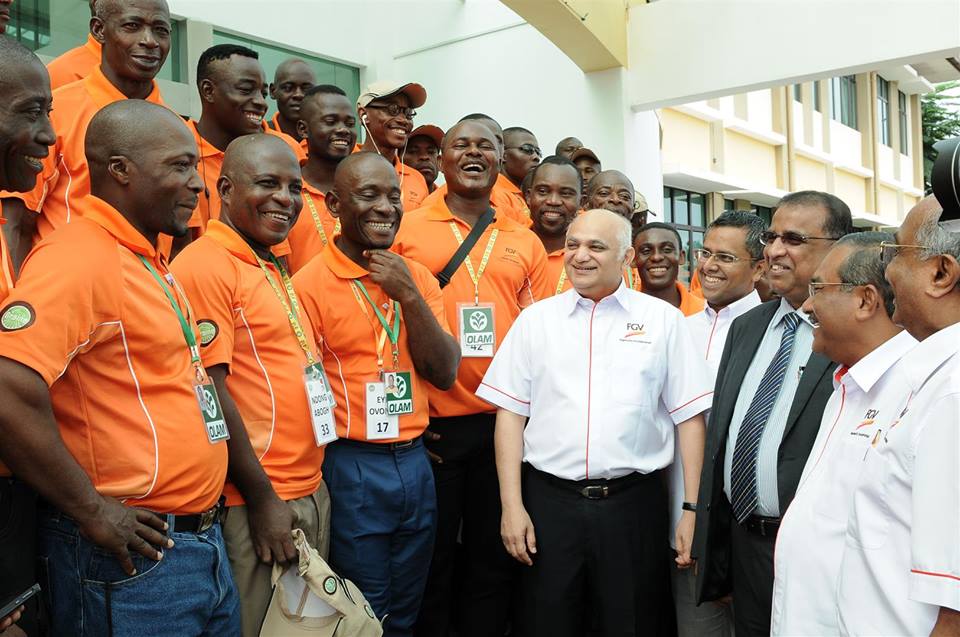
Olam International Ltd and Felda Global Ventures Holdings Berhad (FGV) has teamed up to provide a training programme in Oil Palm Plantation Management for over 2,000 Gabonese smallholder farmers to help them become commercially viable RSPO certified plantation owners in Gabon.
The initiative is part of Project Gabon des Réalisations Agricoles et des Initiatives Nationaux Engagés (Project GRAINE), a joint initiative of the Republic of Gabon and Olam International to promote rural development through a pioneering ‘out-grower’ programme.
Project GRAINE was developed based on the Federal Land Development Authority (FELDA) model whereby parcels of land that are environmentally and socially suitable for palm oil development are identified and allocated to cooperatives, Project GRAINE aims to create a balanced agricultural economy for Gabon that enables rural communities to become more self-reliant in food production.
It is the first time a programme of this scale and nature has been undertaken in Africa, with the government of Gabon providing the land and financial resources for developing the smallholder plantations and logistics infrastructure, while Olam, as a private enterprise with proven expertise in palm plantation development through its joint-venture with the RoG, leads in the development and management of the nucleus and smallholder plantations.
In order to receive the land parcels, the Gabonese farmers must undergo rigorous training in Best Agricultural Practices to enable them to achieve RSPO certification. This training is now being supplied by FGV with the support of Olam for the first batch of 54 programme participants.
President/ Global Head of Plantations Olam International Ltd of Olam International, Supramaniam Ramasamy commented:
“We would like to express our sincere appreciation to FGV for undertaking this training programme with Olam. We look forward to an exciting and productive working relationship with a partner that is recognised by both the World Bank and the United Nations as the most successful out-grower development model in the world.”
Farmers that successfully complete the training programme will be awarded seven hectares of suitable land which will include a 0.5 hectare plot with a house and area for growing food crops.
This model of developing out-grower networks through offering land and training to landless rural poor has been based on the experience of FELDA in Malaysia, which today has developed 850,000 hectares of oil palm, of which 479,000 hectares owned by more than 112,000 out-grower ‘settlers’.
Today, its public listed commercial arm FGV is responsible for producing about one-fifth out of Malaysia’s total crude palm oil production of 18 million tonnes.
FGV Group President and CEO Dato’ Mohd Emir Mavani Abdullah said the programme demonstrates FGV’s commitment to sustainability and promoting Best Agriculture Practices in palm oil.
“FGV is keen on ensuring sustainable future for the industry. It defines our actions towards adopting Best Agricultural Practises in our plantations and we are heartened to share our expertise and experience with the Gabonese,” said Emir.
The four-month course includes practical and classroom lessons led by experienced trainers from FGV on plant and soil science, cultivating and maintaining palm oil estates, RSPO standards, occupational safety and health, Best Agricultural Practices, as well as Basic English language lessons. Teaming up with Malaysian small-scale plantation owners, Gabonese farmers will learn how to farm beyond subsistence levels to start a commercial enterprise.
The training programme will also include study visits to relevant facilities such as oil mills, a rubber factory, ‘Oil Palm settlers villages and research facilities as well as giving the participants a taste of Malaysian culture and life, local attractions and festivities, and, of course, local food!
The training programme will have life-changing consequences for its participants and the Republic of Gabon. Through total immersion, this will introduce Gabonese farmers to international best practice in modern, sustainable plantation management.
Ends
